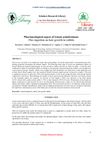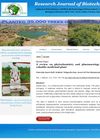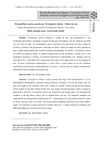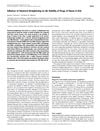 October 2023 in “Dermatology practical & conceptual”
October 2023 in “Dermatology practical & conceptual” Hair loss might be linked to eye aging due to inflammation markers in blood.

Eating flaxseed made rabbit hair longer and thicker and improved their weight and blood sugar and cholesterol levels.
 10 citations,
November 2022 in “Protein & Cell”
10 citations,
November 2022 in “Protein & Cell” Quercetin significantly helps hair growth by activating hair follicles and improving blood vessel formation around them.
 45 citations,
October 2014 in “Stem cell research & therapy”
45 citations,
October 2014 in “Stem cell research & therapy” Modified rat stem cells on a special scaffold improved blood vessel formation and wound healing in skin substitutes.
 February 2022 in “Research Journal of Biotechnology”
February 2022 in “Research Journal of Biotechnology” Eclipta alba L. is a medicinal plant with many health benefits, including treating diseases and promoting hair growth.
 4 citations,
January 2011 in “International Journal of Trichology”
4 citations,
January 2011 in “International Journal of Trichology” Accidental findings have led to new hair treatment discoveries, like using blood pressure and diabetes medications for hair loss and unwanted hair.
 4 citations,
March 2023 in “Journal of medical case reports”
4 citations,
March 2023 in “Journal of medical case reports” Taking too much vitamin E caused a young man's blood clotting problems, which improved after he stopped the vitamin E and got treatment.
 31 citations,
August 2022 in “Frontiers in Oncology”
31 citations,
August 2022 in “Frontiers in Oncology” Photobiomodulation therapy helps manage cancer treatment side effects but needs more research for optimization.
 155 citations,
May 2016 in “Nature communications”
155 citations,
May 2016 in “Nature communications” Memory T cells in the skin balance staying put and moving into the blood, clustering around hair follicles, and increasing in number after infection.
 421 citations,
January 2015 in “Chemical Society Reviews”
421 citations,
January 2015 in “Chemical Society Reviews” Improving artificial vascular grafts requires better materials and surface designs to reduce blood clotting and support blood vessel cell growth.
 15 citations,
September 2005 in “The Journal of the American Animal Hospital Association/Journal of the American Animal Hospital Association”
15 citations,
September 2005 in “The Journal of the American Animal Hospital Association/Journal of the American Animal Hospital Association” Trilostane effectively treated hair loss in Alaskan Malamutes with no adverse effects.
 1 citations,
July 2023 in “F&S Reviews”
1 citations,
July 2023 in “F&S Reviews” Some common medications may harm male fertility by affecting hormones, sperm production, and sexual function.
2 citations,
March 2022 in “Indian Journal of Psychiatry/Indian journal of psychiatry” The conclusion is that careful management of both psychiatric and skin conditions is crucial for HIV patients, using medication and interdisciplinary approaches.
 January 2023 in “Pesquisa Veterinária Brasileira”
January 2023 in “Pesquisa Veterinária Brasileira” A KRT71 mutation in Hereford cattle in Uruguay causes thin, curly hair and scaly skin.
 January 2021 in “Revista brasileira de higiene e sanidade animal”
January 2021 in “Revista brasileira de higiene e sanidade animal” A dog with skin lesions was successfully treated for a human-type fungal infection.
 7 citations,
February 2022 in “Stem cell reviews and reports”
7 citations,
February 2022 in “Stem cell reviews and reports” Skin cells show flexibility in healing wounds and forming tumors, with potential for treating hair disorders and chronic ulcers.
 4 citations,
December 2009 in “Elsevier eBooks”
4 citations,
December 2009 in “Elsevier eBooks” Breadfruit is nutritious and has potential health and medicinal benefits, but is currently underused.
 January 2024 in “Authorea (Authorea)”
January 2024 in “Authorea (Authorea)” STK11 gene polymorphism does not predict metformin response in PCOS.
 40 citations,
March 2022 in “Small”
40 citations,
March 2022 in “Small” Hydrogel with M2-derived exosomes improves wound healing by slowly releasing exosomes that help reduce inflammation and promote tissue repair.
2 citations,
October 2023 in “Biology” Cobalt is important for health but too much or too little can cause health problems, and its environmental buildup is a concern.
 18 citations,
March 2022 in “Drug design, development and therapy”
18 citations,
March 2022 in “Drug design, development and therapy” Platelet-rich plasma (PRP) may help with various hair loss types, but more research is needed to find the best use method.
 January 2024 in “International journal of pharmaceutical sciences review and research”
January 2024 in “International journal of pharmaceutical sciences review and research” Indian jujube has many medicinal properties and can help treat ailments like diabetes, inflammation, and cancer.
 8 citations,
October 2014 in “Journal of analytical toxicology.”
8 citations,
October 2014 in “Journal of analytical toxicology.” Chemical hair straightening significantly reduces detectable drug levels in hair.
 19 citations,
September 1995 in “Food and nutrition bulletin”
19 citations,
September 1995 in “Food and nutrition bulletin” Leucaena leucocephala is nutritious but needs careful processing to remove toxins.
 18 citations,
January 2020 in “Indian Dermatology Online Journal”
18 citations,
January 2020 in “Indian Dermatology Online Journal” Platelet-rich plasma shows potential for hair loss and skin rejuvenation but needs more research for widespread use.
 1 citations,
December 2004 in “Hepatology”
1 citations,
December 2004 in “Hepatology” Tenofovir is more effective than adefovir for resistant hepatitis B, Fibroscan is good for assessing liver damage, regulatory T cells may help hepatitis C persist, and other insights into liver health and disease were found.
 36 citations,
May 2015 in “Australasian Journal of Dermatology”
36 citations,
May 2015 in “Australasian Journal of Dermatology” Low dose oral minoxidil helps regrow hair in permanent chemotherapy-induced alopecia.
14 citations,
December 2021 in “International journal of molecular sciences” Growth hormone levels affect hair growth and loss, with too much causing excess hair and too little leading to hair loss.
1 citations,
November 2018 in “immuneACCESS” Expanded CD8+ T cells are linked to Alopecia Areata and may cause relapse after treatment.
 October 2024 in “International Journal of Ayurveda Research”
October 2024 in “International Journal of Ayurveda Research” Emblica officinalis and Eclipta alba may help treat hair loss naturally.


























